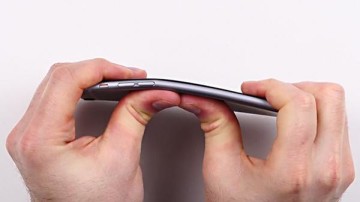 MIT Technology Review has been going through the bankruptcy documents of GT Advanced and seems to have found out what went wrong – and why the iPhone 6 bends.
MIT Technology Review has been going through the bankruptcy documents of GT Advanced and seems to have found out what went wrong – and why the iPhone 6 bends.
Apple invested more than $1 billion in an effort to make sapphire one of the device’s big selling points. Making screens out of the nearly unscratchable material would have helped set the new phone apart from its competitors. It would have also enabled it to be structurally strong
When Apple announced the iPhone 6 this September, however, it didn’t have a sapphire screen, only a regular glass one and was structurally weak, so that it bent in your pocket.
GT Advanced Technologies, declared bankruptcy as without Apple it was doomed.
Apple had been using sapphire to cover the cameras and fingerprint sensors in some iPhones since October 2013. But making large pieces of sapphire—enough for a smartphone screen—would normally cost 10 times as much as using glass.
In 2013, GT claimed it could cut the cost by two thirds by increasing the size of its equipment and adapting the crystal growth procedures to make cylindrical crystals—called boules—that are more than twice as large as ordinary sapphire crystals.
Apple originally offered to buy sapphire growing furnaces from GT. But according to sources familiar with negotiations, after five months Apple demanded a major change in terms, requiring GT to supply the sapphire itself. Apple wanted to drive costs down by having GT build the world’s largest factory to produce the stuff.
Apple moaned in the court documents that GT failed to produce “any meaningful quantity of useable sapphire”.
However GT’s bankruptcy filing said that was mostly Apple’s fault.
Producing sapphire requires a very clean environment, but construction at the factory meant that sapphire was grown “in a highly contaminated environment that adversely affected the quality of sapphire material,” according to GT.
It also needs uninterrupted supplies of water and electricity to regulate the temperature of the molten aluminium oxide used to form the boule. GT said that to save costs, Apple decided not to install backup power supplies, and multiple “outages” ruined whole batches of sapphire.
GT said in the documents that there were problems with much of the sawing and polishing equipment used to slice the boule—equipment that it says Apple selected. For example, a diamond-wire saw that was supposed to cut sapphire in 3.6 hours took 20 hours to do it and had to be replaced. According to GT, problems like these increased the costs of processing the sapphire boule by 30 percent.
Then came the worst of it. The terms Apple negotiated committed GT to supplying a huge amount of sapphire, but put Apple under no obligation to buy it.
 Apple is turning to smartphone archrival Samsung in order to fix an iBug with its new iPhone 6 phablet.
Apple is turning to smartphone archrival Samsung in order to fix an iBug with its new iPhone 6 phablet.


















